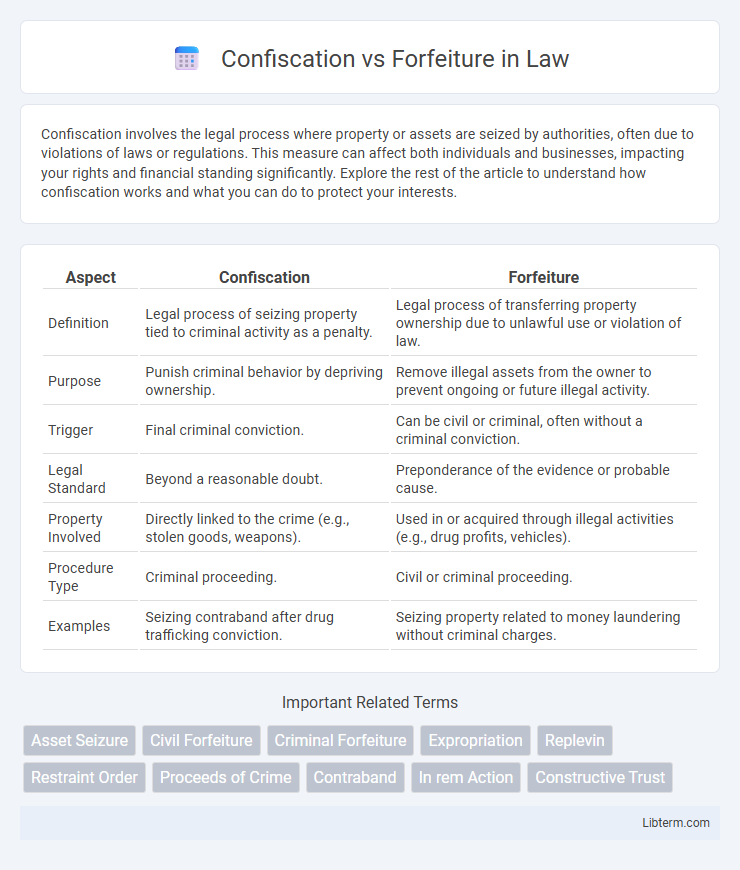Confiscation involves the legal process where property or assets are seized by authorities, often due to violations of laws or regulations. This measure can affect both individuals and businesses, impacting your rights and financial standing significantly. Explore the rest of the article to understand how confiscation works and what you can do to protect your interests.
Table of Comparison
| Aspect | Confiscation | Forfeiture |
|---|---|---|
| Definition | Legal process of seizing property tied to criminal activity as a penalty. | Legal process of transferring property ownership due to unlawful use or violation of law. |
| Purpose | Punish criminal behavior by depriving ownership. | Remove illegal assets from the owner to prevent ongoing or future illegal activity. |
| Trigger | Final criminal conviction. | Can be civil or criminal, often without a criminal conviction. |
| Legal Standard | Beyond a reasonable doubt. | Preponderance of the evidence or probable cause. |
| Property Involved | Directly linked to the crime (e.g., stolen goods, weapons). | Used in or acquired through illegal activities (e.g., drug profits, vehicles). |
| Procedure Type | Criminal proceeding. | Civil or criminal proceeding. |
| Examples | Seizing contraband after drug trafficking conviction. | Seizing property related to money laundering without criminal charges. |
Introduction to Confiscation and Forfeiture
Confiscation and forfeiture are legal processes used by governments to seize assets connected to criminal activity or regulatory violations. Confiscation typically follows a criminal conviction, enabling authorities to permanently take property used in or derived from illegal acts. Forfeiture can occur through civil or administrative procedures, often without a criminal conviction, targeting assets suspected of being linked to unlawful conduct.
Defining Confiscation
Confiscation is the legal process whereby authorities seize property or assets without compensation, typically due to involvement in criminal activity or violation of laws. It aims to deprive individuals of illegally obtained goods and deter unlawful behavior by removing financial benefits tied to criminal conduct. Unlike forfeiture, confiscation often involves a direct penalty imposed by the state through administrative or judicial actions.
Understanding Forfeiture
Forfeiture is a legal process where the government permanently takes ownership of property or assets linked to criminal activity, often without requiring a criminal conviction. It serves as a tool to disrupt illegal enterprises by removing instruments or proceeds of crime, such as cash, vehicles, or real estate. Unlike confiscation, which generally results from a court order following a criminal conviction, forfeiture can occur through civil proceedings, emphasizing the focus on the property's connection to unlawful conduct.
Key Legal Differences
Confiscation refers to the government's act of seizing property directly related to criminal activity without compensation, typically after a conviction. Forfeiture involves the loss of property rights as a penalty, which can be either civil or criminal, and may occur without the owner being charged with a crime. Key legal differences include the burden of proof, with forfeiture often requiring a lower standard, and the scope of assets eligible, where forfeiture can target property indirectly connected to illegal conduct.
Purposes and Objectives
Confiscation aims to deprive individuals of assets directly linked to criminal activity, thereby disrupting illegal operations and deterring future crimes. Forfeiture serves to seize properties believed to be involved in or gained through unlawful conduct, reinforcing law enforcement efforts and promoting justice. Both mechanisms seek to undermine criminal profitability and enhance public safety by removing illicit gains from offenders.
Procedures and Due Process
Confiscation typically involves the immediate seizure of property without prior notice, often in connection with criminal activity, whereas forfeiture requires a legal process where the government must prove the property is linked to illegal acts. Due process in forfeiture includes the right to a hearing, legal representation, and the opportunity to contest the seizure, ensuring property owners are treated fairly under the law. Procedures for confiscation may prioritize swift action to prevent further illegal use but are subject to review to protect constitutional rights.
Real-World Examples
Confiscation involves the government seizing property linked to criminal activity, such as drug trafficking assets in Mexico, where authorities confiscate large drug shipments and vehicles used in smuggling. Forfeiture often extends beyond seizure to permanent loss of ownership even without criminal charges, exemplified by the United States Department of Justice's Asset Forfeiture Program, which targets properties connected to financial crimes like money laundering. Both mechanisms play critical roles in dismantling criminal enterprises by disrupting financial incentives and resources worldwide.
Impact on Property Owners
Confiscation involves the government taking property without compensation, often in cases related to criminal activity, causing significant financial loss and legal challenges for property owners. Forfeiture typically occurs after a legal process where property tied to illegal acts is seized, impacting owners by potentially stripping them of assets even if no criminal charges are filed against them. Both processes create uncertainty and can undermine property owners' rights, emphasizing the need for clear legal protections and due process.
International Perspectives
Confiscation involves the government seizing property tied to criminal activity, often without compensation, and is widely used across jurisdictions like the United States, the United Kingdom, and the European Union. Forfeiture extends beyond confiscation by including assets deemed proceeds of crime, with international frameworks such as the United Nations Convention against Corruption guiding cross-border cooperation. Variations in procedural safeguards and legal standards highlight the importance of harmonizing international policies to ensure effective asset recovery and respect for human rights.
Conclusion and Future Trends
Confiscation typically involves the compulsory seizure of property linked to criminal activity by the government, whereas forfeiture extends to assets derived from or used in illegal conduct, often with civil proceedings. Emerging trends reveal a shift towards enhanced digital asset tracking and international cooperation to combat cross-border financial crimes. Future enforcement strategies are expected to integrate advanced technologies like blockchain analytics to ensure more efficient and transparent asset recovery processes.
Confiscation Infographic

 libterm.com
libterm.com